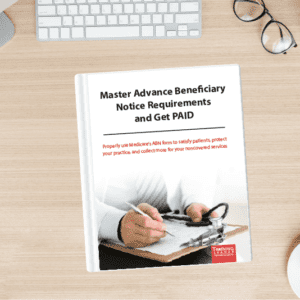QUESTION: What do educators mean by mandatory vs voluntary ABN? Is it the same form? Question from Long Island, NY Subscriber
ANSWER: To secure payments and prevent audits, you must have your patients sign a Medicare Advance Beneficiary Notice of Noncoverage (ABN) form. Don’t risk fines and face write-offs by not issuing the form when you should. Medicare requires you to issue an ABN to a patient when you have reason to believe that a proposed treatment, service, or item that Medicare typically covers, won’t be covered in the patient’s situation. This is considered a mandatory ABN, and you would use this type in the following situations:
- Initiation of treatment: When you have information that Medicare may not reimburse you for a service that is typically covered prior to the start of you providing care, you are required to issue an ABN.
- Decrease in services: When a patient’s changing needs cause the provider to decrease the volume of the patient’s service, Medicare will usually consider the original, higher volume, to be no longer reasonable or medically necessary. If your patient wants to continue to receive the higher volume even if Medicare won’t fully cover, you must issue an ABN for the difference between what Medicare will pay and the higher volume the patient wants. Beware: Having a completed and signed ABN is the only way you are allowed to bill the patient for the additional amount due.
- Discontinuation of care: When the provider has determined that a patient no longer needs a service, but the patient disagrees and wants to continue, Medicare probably will not cover the service any longer. In these cases, you must issue an ABN so that you can collect from the patient directly.
- Lack of medical necessity: The service is not medically necessary such as the diagnosis code does not support medical necessity for the service.
- Frequency limitations exceeded: When a patient requests a service more often than determinations allows such as a retest of a lab test that Medicare allows only once per year.
- Screenings outside coverage areas: Issue a mandatory ABN when a patient requests a screening in an area not covered by policies such as a request for a telemedicine screening outside a rural coverage area.
What is a Voluntary Medicare ABN?
When you choose to issue an ABN even though it isn’t required by Medicare, you file a voluntary ABN. For example, you are not required to use an ABN for services that are not part of the Medicare program (statutorily excluded services) or with private payer patients, but you may choose to do so as a courtesy. When you know services are not covered by Medicare, even though you aren’t required to issue a voluntary ABN, doing so allows you to bill the patient.
When you issue an ABN as a voluntary notice, you don’t have the beneficiary choose an option box or sign the notice. For expert advice and step-by-step guidance on how to correctly use a mandatory or voluntary ABN form, get help from expert coder, Leonta (Lee) Williams, RHIA, CCS, CCDS, CPC, CPCO, CRC, CEMC, CHONC.
During her 60-minute live online rebroadcast Mandatory vs Voluntary: When Is an ABN Necessary?, you’ll learn how to correctly determine the situations wherein a mandatory or voluntary ABN form should be used.
Commonly Purchased Online Training and Resources
-
 Mandatory vs. Voluntary: When is an ABN Necessary?$247.00 – $257.00
Mandatory vs. Voluntary: When is an ABN Necessary?$247.00 – $257.00 -
 2020 ICD-10-CM Codes Update$247.00 – $257.00
2020 ICD-10-CM Codes Update$247.00 – $257.00 -
 Master Advance Beneficiary Notice Requirements and Get PAID$197.00
Master Advance Beneficiary Notice Requirements and Get PAID$197.00
